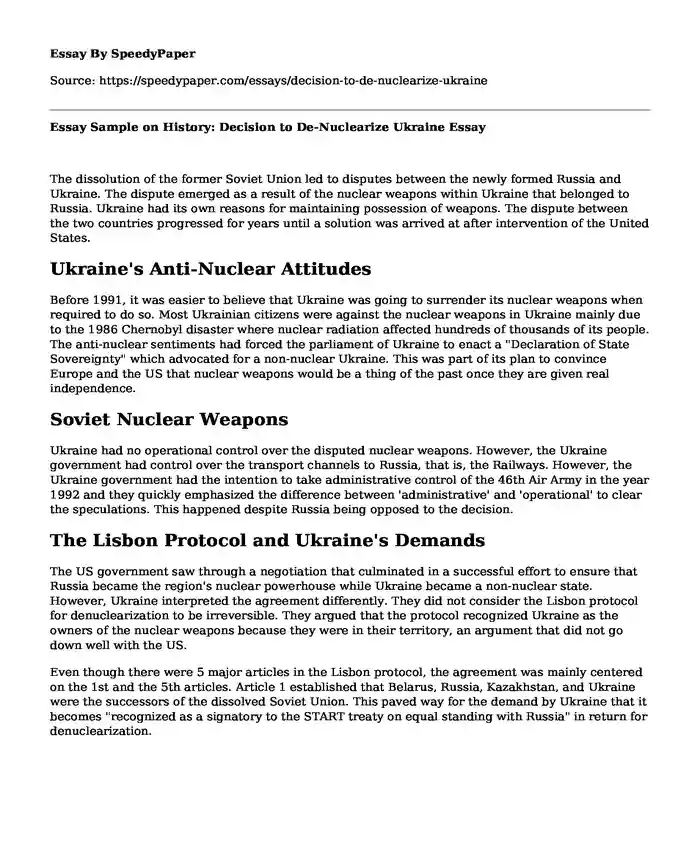The dissolution of the former Soviet Union led to disputes between the newly formed Russia and Ukraine. The dispute emerged as a result of the nuclear weapons within Ukraine that belonged to Russia. Ukraine had its own reasons for maintaining possession of weapons. The dispute between the two countries progressed for years until a solution was arrived at after intervention of the United States.
Ukraine's Anti-Nuclear Attitudes
Before 1991, it was easier to believe that Ukraine was going to surrender its nuclear weapons when required to do so. Most Ukrainian citizens were against the nuclear weapons in Ukraine mainly due to the 1986 Chernobyl disaster where nuclear radiation affected hundreds of thousands of its people. The anti-nuclear sentiments had forced the parliament of Ukraine to enact a "Declaration of State Sovereignty" which advocated for a non-nuclear Ukraine. This was part of its plan to convince Europe and the US that nuclear weapons would be a thing of the past once they are given real independence.
Soviet Nuclear Weapons
Ukraine had no operational control over the disputed nuclear weapons. However, the Ukraine government had control over the transport channels to Russia, that is, the Railways. However, the Ukraine government had the intention to take administrative control of the 46th Air Army in the year 1992 and they quickly emphasized the difference between 'administrative' and 'operational' to clear the speculations. This happened despite Russia being opposed to the decision.
The Lisbon Protocol and Ukraine's Demands
The US government saw through a negotiation that culminated in a successful effort to ensure that Russia became the region's nuclear powerhouse while Ukraine became a non-nuclear state. However, Ukraine interpreted the agreement differently. They did not consider the Lisbon protocol for denuclearization to be irreversible. They argued that the protocol recognized Ukraine as the owners of the nuclear weapons because they were in their territory, an argument that did not go down well with the US.
Even though there were 5 major articles in the Lisbon protocol, the agreement was mainly centered on the 1st and the 5th articles. Article 1 established that Belarus, Russia, Kazakhstan, and Ukraine were the successors of the dissolved Soviet Union. This paved way for the demand by Ukraine that it becomes "recognized as a signatory to the START treaty on equal standing with Russia" in return for denuclearization.
The Trilateral Agreement
There was a signing of a trilateral agreement later on between Russia, Ukraine, and the US that ensured Ukraine's commitment to "the elimination of all nuclear weapons, including strategic offensive arms, located in its territory." Ukraine made a promise to deactivate all the SS-24s in its territory within a period of not more than 10 months. They would do this by removing the warheads of the SS-24s. Additionally, in excess of 200 warheads were to be transferred by Ukraine to Russia to be dismantled within the same period. The period over which Ukraine was to become completely non-nuclear was unknown. Nevertheless, the Ukrainian government secretly intended to wind up the withdrawal of weapons by June 1996. Under the agreement, the US, as well as Russia, promised the Ukraine government an unspecified financial compensation.
In the negotiations that led to the trilateral agreement, Ukraine had argued that it lacked the expertise to control the weapons in its territory. It also lacked the finances and necessary technology for the maintenance of the nuclear weapons within its boundaries.
Conclusion
Overall, the dispute between Russia and Ukraine was characterized by twists and turns. The reluctance by Ukraine to surrender the weapons was partly attributed to fears of redeployment by Russia once they possessed the nuclear weapons. Misinterpretation of the Lisbon agreement by Ukraine negotiators was also a major factor that stalled the resolution of the stalemate. However, the Trilateral Agreement changed things for the better and all parties in the dispute were satisfied with the outcome.
Cite this page
Essay Sample on History: Decision to De-Nuclearize Ukraine. (2022, Mar 22). Retrieved from https://speedypaper.com/essays/decision-to-de-nuclearize-ukraine
Request Removal
If you are the original author of this essay and no longer wish to have it published on the SpeedyPaper website, please click below to request its removal:
- Career Strategy Essay Sample
- Banning Bottled Water in Canada - Free Essay on Environmental Problems
- Literary Essay Sample on The Most Dangerous Game Story
- The Birthmark by Nathaniel Hawthorne, Free Essay Example
- Essay Example on the Greatest Threat to Humanity
- Essay Example on Emotional Intelligence at No Charge
- Paper Example. Single Parent Households
Popular categories





